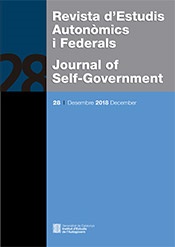Federalism and Recent Political Dynamics in Austria
Article Sidebar

Main Article Content
Peter Bussjäger
Christoph Schramek
Mirella M. Johler
From a comparative perspective, the Austrian Federal Constitution appears rather centralized, given that the majority of legislative competences are allocated at the federal level. However, a closer look indicates that the Länder (the federal units) gain considerable political weight by serving as the administrative centre of gravity; namely, the Länder execute their own laws and most of the laws based on the federation’s subject-matters. Hence, one might speak of “administrative federalism”. History shows that Austrian politics resemble a tug-of-war over the federal division of (legislative) competences. The newly elected coalition government’s program joins the ranks of long-winded discussions on how to make Austrian federalism more efficient. Even if pro-federal by rhetoric, the actual content of the government program is either conceptually ambivalent or substantially in favour of increased (legislative) centralization, especially in the realm of social and educational policy.
Paraules clau
Administrative Federalism, Austria, Coalition Government, Distribution of Competences, Education, Federal Constitution, Federalism, Federation, Government Program, Parliament, Reform, Social Policy
Article Details
Com citar
Bussjäger, Peter et al. “Federalism and Recent Political Dynamics in Austria”. Revista d’estudis autonòmics i federals, no. 28, pp. 74-100, https://raco.cat/index.php/REAF/article/view/349237.